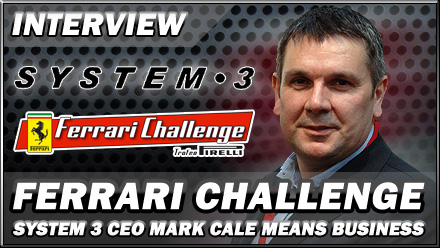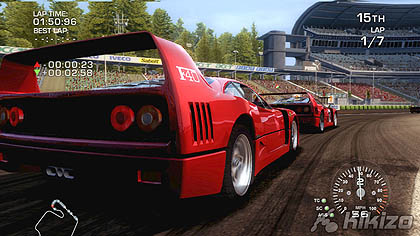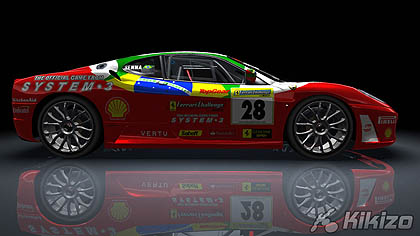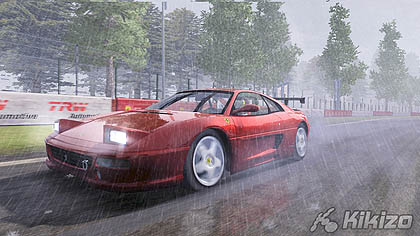Ferrari Challenge: Mark Cale Interview
We talk to the head of System 3 about his imminent racing game, Ferrari Challenge Trofeo Pirelli.

Originally slated for release in the latter half of 2007, Ferrari Challenge Trofeo Pirelli (not to be confused with the AM2 Dreamcast title, Ferrari F355 Challenge) abruptly vanished off the radar, and with System 3 giving little information there were fears the game may never see the light of day. Those fears were dispelled though when Mark Cale, CEO of System 3, recently pulled the sheets off its new motor - and very impressive it is, too.
Ferrari Challenge has clearly been a labour of love for developer Eutechnyx and publisher System 3, not to mention from the Ferrari brand itself.
Due out in Europe early July (and set for a US release in August courtesy of Activision) for Wii, DS, PS2 and PS3 (with the latter being its flagship format), Ferrari Challenge will be up against stiff competition like Race Driver GRiD and Gran Turismo 5 Prologue, so does it have what its takes to make its mark, and establish its own niche within the genre?
A recent showing took place rather appropriately at the Silverstone race track, and with unrestricted access granted to all areas of the paddock and the Ferrari motor homes, this was truly an exciting proposition for any racing fan. Kikizo took the opportunity to interview Mark Cale about his passion for racing and Ferraris, and bringing his racing vision into the home.
Kikizo: Thanks for joining us Mark - Ferrari Challenge, where did it all start for you?
Cale: The beginning was probably when I was about 7 or 8 years old, when I first started watching Formula 1; I just loved the passion of Ferrari and the glamour of Ferrari way, way back then. In fact, some years later I was probably the only English school boy in my school that was supporting Niki Lauda when James Hunt was in the hunt for the title and Niki Lauda unfortunately crashed at Nurburgring and that was the end of the Championship. That was back in '76 when I was twelve and really all throughout growing up - all I wanted to do was have a Ferrari and be a race driver - it's like a football team you support. You support one team, I support Arsenal, I support Ferrari - that's it! It doesn't matter if they're good, bad or whatever. It took 21 years for Ferrari to win a World Championship, and obviously I was supporting Ferrari when I they were coming in 8th, 9th, 10th in a race which generally would happen. Now, they are on a big high and really well organised.
Kikizo: So you have always had personal ambitions to own a Ferrari?
Cale: I had a desire to really find a way to own my own Ferrari and I the only way I could do that was to get your own successful business and that is really the whole reason System 3 was born, through the desire to have enough disposable income potentially to own a Ferrari at the end of it. So about 25 years on since I started System 3, here I am publishing Ferrari on all the consoles except 360; it's two ambitions collided for me into a wide-ranging, emotional gratification. I love video games; love Ferrari, two main interests in my life, apart from my family that is my greatest interest.
Kikizo: On embarking on this project, were you aware of the scale of the final product?
Cale: I was totally aware of the scale of it and of course what we wanted to do is not just to make a Ferrari product but try and create one of the best racing games ever created, because of course once you are using a name like Ferrari you're there to be knocked down. Some people want you to fail; they want to have a reason to write a negative thing about a Ferrari game or whatever. Obviously that's not happening, people are saying this is potentially the best racing game ever done, a lot of journalists have given a lot of positive remarks as to why it is better than Gran Turismo, we always knew we were better than Forza 2 by a mile, but to show that we are better than Gran Turismo then a lot of things have come true. That responsibility about protecting a brand and not just selling a game, because it's got Ferrari logo on the box, is the most important thing. So it's a huge responsibility that you have with promoting this brand.
Kikizo: Obviously there's a lot of competition within the racing genre but what were the key aspects you focused on, something you wanted to really work on developing?
Cale: I think the AI is superb. The first thing to really sort of do, what I call bump-and-grind racing was probably TOCA from Codemasters years ago. Of course you mention Race Driver GRID and all of the stuff they've been doing recently but it feels very dead compared to the way Codies were before, and I feel since the Darlings have left something has gone from that passion of making a race game a race game. The AI and our game is unique in that it is not splined first of all. Let's look at Gran Turismo Prologue: I don't call it a race, I call it a time trial with obstacle courses, because the same car does the same thing all of the time. It's sprints it's all about how quick you can be, to be fastest - I've raced cars, that's not a racing experience! What's all this 50 credits? Maybe I can upgrade from one bad Japanese car to maybe not such a bad Japanese car a month down the line. It takes towards the end of the game before you actually get to your performance cars.
So really the challenge we have brought back, is how do we bring the right experience right from the beginning? Let's start with the AI; these prevent you from using them just as an obstacle to go around. We have progressive AI, progressive intelligence and its all done by what we call a virtual button technology. Basically the car at the speed controlled by the AI works out who is behind, what is in front, does he brake late, does he brake conservatively and depending on the scenario he may out-brake himself. You will quite often see AI cars knocking each other off the track or if he has tried to out-brake you because you are trying to pass him; AI actually defend a corner like a proper race, and I think that was probably the most successfully realised challenge that we have overcome was to make it feel like a real race game.
The next significant challenge was how you balance mass market with hardcore gamers that want a sim, and we've now created what we believe to be an "arcade sim". It's an arcade sim because you can adjust your assists in certain ways to make it feel more like an arcade game, but if you switch them off it feels like a real race car. Too much power, side kicks out or you loose control, you don't press the brakes properly, you roll on and roll off brakes and the track way to control your car, and you steer the car with the accelerator and the brake. Obviously with the assists on you don't, it is a slightly different experience and that is why we call it an arcade race simulation because it's mixing the both.
Now you are going to have hardcore gamers that are going to want it as a sim. But a lot of Ferrari people are mass market customers that are not really into hardcore simulations, so that is the next big challenge, and I feel that we have totally overcome that with our sophisticated, adjustable balancing with this current set of assists.
Kikizo: So you've got the AI and balanced assists, but let's look at the third major issue, crash damage, and can we smash these beauties up? It's always been an issue with car manufacturers feeling uncomfortable seeing their products smashed up in a game so how have you managed this with Ferrari?
Cale: Yes, convincing Ferrari to put damage on the cars was our next big challenge. So as you said we've already overcome three major challenges, the crash damage is in there but we didn't just stop there; look at the environmental effects with the rain and look at the dust when you go over the kitty litter, dust goes over the bumper, the more you go off the dirtier your car gets, it gets bits of tyre debris and everything else. Instead of wasting all the memory on the PS3 to do the most amazing paint effects like Gran Turismo, and have a sterile clinical feel, we have got something that is full of my emotion, and I feel the game has got my enthusiasm encapsulated in it.












 Satoru Iwata Video Interview - the late Nintendo president spoke with Kikizo in 2004 as 'Nintendo Revolution' loomed.
Satoru Iwata Video Interview - the late Nintendo president spoke with Kikizo in 2004 as 'Nintendo Revolution' loomed. Kaz Hirai Video Interview - the first of Kikizo's interviews with the man who went on to become global head of Sony.
Kaz Hirai Video Interview - the first of Kikizo's interviews with the man who went on to become global head of Sony. Ed Fries Video Interview - one of Xbox's founders discusses an epic journey from Excel to Xbox.
Ed Fries Video Interview - one of Xbox's founders discusses an epic journey from Excel to Xbox. Yu Suzuki, the Kikizo Interview - we spend time with one of gaming's most revered creators.
Yu Suzuki, the Kikizo Interview - we spend time with one of gaming's most revered creators. Tetris - The Making of an Icon: Alexey Pajitnov and Henk Rogers reveal the fascinating story behind Tetris
Tetris - The Making of an Icon: Alexey Pajitnov and Henk Rogers reveal the fascinating story behind Tetris Rare founders, Chris and Tim Stamper - their only interview? Genuinely 'rare' sit down with founders of the legendary studio.
Rare founders, Chris and Tim Stamper - their only interview? Genuinely 'rare' sit down with founders of the legendary studio. The History of First-Person Shooters - a retrospective, from Maze War to Modern Warfare
The History of First-Person Shooters - a retrospective, from Maze War to Modern Warfare